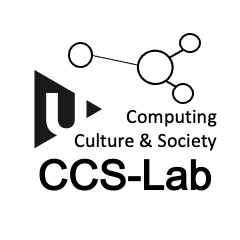CCS-Lab at the University of West Bohemia invite you to a second series of lectures and transdisciplinary seminars on the topic:
Computing Culture & Society: Applications and Reflections
rationale: Today, computer technologies have a transformative impact on the way we conduct research across the academy, including humanities and social sciences (HaSS). However, to produce really novel insights, it appears that the computational approaches to culture and society require collaboration of experts across the whole spectrum of academic disciplines. Around the globe, we observe an emergence of new specialized research centers designed to facilitate such transdisciplinary collaboration. Some of these centers will be introduced in the lectures by international guests. In the seminars, researchers from two faculties and four departments at the University of West Bohemia (UWB) will discuss their research within this scope to receive feedback from scholars with a different academic background or to enhance potential future collaborations.
format: All events are available to the public and will be held in a hybrid format, with an opportunity to decide either for a physical attendance or to connect virtually via ZOOM. However, for an on-site attendance in the cafe Kulturka, please register using the form below. The international guests will connect virtually.
location: cafe Kulturka ZČU, Sedláčkova 19, Plzeň
zoom link: https://cesnet.zoom.us/j/93139477086
contact person: Vojtěch Kaše (Department of Philosophy, UWB, kase@kfi.zcu.cz, 773205608)
Friday, April 1
LECTURES:
09:30 – Howard Hotson (Oxford University), Digital Scholarship @ Oxford: Convergence in Theory and Practice
annotation: Digital Scholarship @ Oxford (DiSc) is a five-year, £2.4 million, inter-disciplinary project, launched on 15 November 2021 and aimed at transforming the application of digital technology to teaching and research in the Humanities. At the centre of the project is a strategy of convergence. In essence this proposes to use the dense cluster of digital assets – in the Bodleian Library, the University’s museums, the Oxford University Press, and the vast range of digitally enhanced research projects in the Humanities Division – as a laboratory for experimenting with different strategies for joining cognate initiatives in and outside Oxford into increasingly coherent, mutually supportive, convergent, and sustainable clusters. This presentation will sketch the thinking underlying the project and illustrate it with a number of representative examples. Howard Hotson is Professor of Early Modern Intellectual History at Oxford, a Fellow of St Anne’s College, Academic Director of Digital Scholarship @ Oxford, and has been PI of a number of major digital projects, including Cultures of Knowledge, Early Modern Letters Online, Reassembling the Republic of Letters, Networking Archives, and Cabinet.
11:00 – Oren Ackermann & Tziona Ben-Gedalya (Arial University), The secret of the archaeological sediments as a human and natural archive
annotation: Human activities transform terrestrial landscapes, composition, and properties, thus, converting soil into exceptional archives which retain and preserve historical records. We work to generate a wide range of datasets from sediments representing various human activities and analyze them utilizing methods including POSL, XRF, Organic Residue Analysis and Microbiome research. Data acquiring is followed by implementing machine learning procedures. Together, these methodologies allow a thorough characterization, developing advanced integrative sediment signatures. This analysis is expected to assist the deciphering of specific intra- and outer site spatial patterns, and reconstruction of activity areas towards a deeper understanding of settlement development and dynamics.
SEMINAR (in Czech):
13:30 – Vojtěch Kaše (Department of Philosophy, UWB), Division of labor, specialization and diversity in the ancient Roman cities: A quantitative approach to Latin epigraphy
14:30 – Ondřej Stulík (Department of Politics and IR, UWB), Working with natural language and equivalences to define extremism
Friday, May 6
LECTURE:
11:00 – Adéla Sobotková (Aarhus University), Dodging the CRAPL: The Challenges of Doing Digital Research in the Humanities
annotation: In my talk, I explain how my research agenda of large-scale diachronic archaeological research in Bulgaria (TRAP) took me to running a national digital infrastructure project for archaeologists in Australia (FAIMS) and embracing digital history in Denmark (CEDHAR & SDAM). I introduce the lessons I learnt and personal musings on sociotechnical obstacles in the adoption of innovations in historical disciplines and on balancing between the doing quantitative digital research and building tools and workflows that scale, can handle historical data, and last for the long-term.
SEMINAR (in Czech):
13:30 – Dalibor Fiala (Department of Computer Science and Engineering, UWB), Modern Informetric Methods for the Evaluation of Scientific Research
14:30 – Ladislav Šmejda (Department of Anthropology, UWB), Gritty in the City: Moral Geography of the Urban Environment
